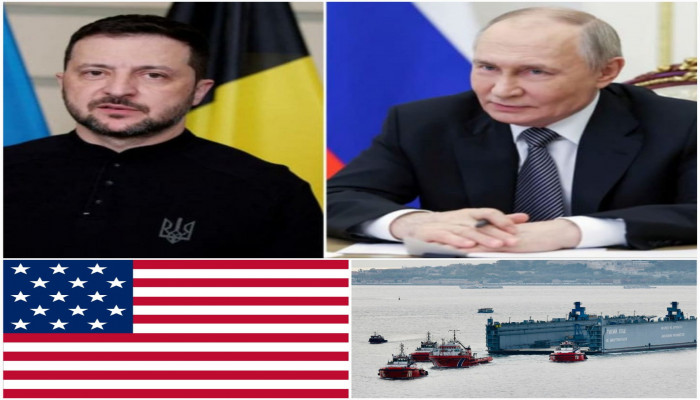Russia and Ukraine agree to maritime and energy ceasefire amid U.S. efforts to ease sanctions on Moscow
- In Reports
- 04:01 PM, Mar 26, 2025
- Myind Staff
On Tuesday, the United States reached separate agreements with Ukraine and Russia to halt attacks at sea and on energy infrastructure. As part of the deal, Washington agreed to push for removing certain sanctions on Moscow. Details on when and how the Black Sea security agreements would take effect remain unclear. However, these are the first formal commitments between the two sides since President Donald Trump took office. Trump is advocating for an end to the war in Ukraine and a swift reconciliation with Moscow, a move that has raised concerns in Kyiv and among European nations.
The U.S. agreement with Russia goes further than the one with Ukraine. Washington pledged to work toward lifting international sanctions on Russian agricultural and fertiliser exports, one of Moscow’s long-standing demands. Following the U.S. announcements, the Kremlin stated that the Black Sea agreements would only take effect if some Russian banks were reconnected to the international financial system.
Ukrainian President Volodymyr Zelensky stated that, to his understanding, the truce agreements did not depend on sanctions relief and should take effect immediately. He accused the Kremlin of trying to “manipulate” the terms of the deals with its statement. In a nightly video address, Zelenskiy said, “They are already trying to distort agreements and, in fact, deceive both our intermediaries and the entire world.”
Kyiv and Moscow stated they would depend on Washington to ensure the agreements were upheld, but each remained doubtful that the other would honour them.
“We will need clear guarantees,” stated Russian Foreign Minister Sergei Lavrov. “And given the sad experience of agreements with just Kyiv, the guarantees can only be the result of an order from Washington to Zelenskiy and his team to do one thing and not the other.”
Zelenskiy stated that if Russia breached the agreements, he would urge Trump to impose more sanctions on Moscow and supply additional weapons to Ukraine. “We have no faith in the Russians, but we will be constructive,” as per Zelenskiy.
Hours after the announcements, Russia and Ukraine accused each other of carrying out drone attacks, but there were no immediate reports of strikes on the Black Sea or energy infrastructure. In an interview with Newsmax, Trump admitted that Russia might be deliberately delaying efforts to end the war. He stated, “I think that Russia wants to see an end to it, but it could be they’re dragging their feet. I’ve done it over the years.”
The agreements were finalised after parallel negotiations in Saudi Arabia, following separate phone calls last week between Trump and the two presidents, Zelenskiy and Vladimir Putin. If carried out, these agreements could mark the first primary step toward Trump's broader goal of securing a lasting ceasefire in the war that began with Russia’s full-scale invasion of Ukraine three years ago. However, Putin rejected Trump’s proposal for a 30-day ceasefire, which Ukraine had already supported.
Speaking to reporters on Tuesday, Trump said, “We are making a lot of progress,” but acknowledged that the talks were marked by “tremendous animosity.” He noted, “There’s a lot of hatred, as you can probably tell, and it allows for people to get together, mediated, arbitrated, and see if we can get it stopped. And I think it will work.” Meanwhile, Washington has recently softened its stance toward Russia. Trump’s envoy, Steve Witkoff, stated that he did not “regard Putin as a bad guy,” a remark that has alarmed European officials who view the Russian leader as a serious threat.
A veteran Russian diplomat, Lavrov, leading the foreign ministry since 2004, argued that Witkoff's optimism about an imminent truce overlooks the role of Kyiv's European allies. “He (Witkoff) significantly overestimates the elites of European countries, who want to ‘hang like a stone around the neck’ of Zelenskiy so as not to allow him to ‘give in’,” stated Lavrov.
Ukraine and its European allies worry that Trump might strike a rushed deal with Putin that compromises their security and gives in to Russian demands, such as forcing Kyiv to abandon its NATO aspirations and surrender territory claimed by Moscow. On Tuesday night, the Kremlin stated that it had agreed with the U.S. to pause attacks on energy infrastructure in both Russia and Ukraine for 30 days starting March 18, when Putin first discussed the matter with Trump. It also expressed a willingness to extend the agreement. Ukraine said it would only accept such a pause under a formal contract.
Meanwhile, Russia has relentlessly targeted Ukraine’s power grid with missiles and drones, while Kyiv has launched long-range strikes on Russian oil and gas facilities. These attacks have become a key strategy for both sides to weaken each other’s war efforts.
The pause in attacks on energy infrastructure is a new development. Still, the Black Sea maritime security agreements address an issue that was crucial in the early days of the war. Back then, Russia effectively blockaded Ukraine’s ports, disrupting grain exports and worsening the global food crisis. Recently, maritime battles have played a minor role in the war after Ukraine’s successful attacks forced Russia to withdraw its naval forces from the eastern Black Sea.
Despite the collapse of a previous U.N.-brokered shipping agreement, Ukraine has reopened its ports and resumed exports at nearly pre-war levels. However, its ports remain under frequent air attacks. Zelenskiy stated that the new deal would prohibit such strikes. Ukrainian Defence Minister Rustem Umerov warned that any movement of Russian military ships beyond the eastern Black Sea would be a violation and a threat, giving Ukraine the right to defend itself.
Moscow stated that the agreement would depend on sanctions relief, including reconnecting Russia’s agricultural export bank to the SWIFT international payment system. Implementing this and other measures would likely require approval from European nations.







Comments